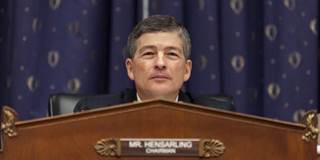Republican House Financial Services Chairman Jeb Hensarling recently proposed a battery of changes to bank regulation in the US. Most of his ideas are political nonstarters, but his plan for an "off-ramp" that would allow banks to take riskier bets, in exchange for maintaining higher capital reserves, makes good policy sense.
CAMBRIDGE – Jeb Hensarling, the Republican chair of the Financial Services Committee in the US House of Representatives, delivered a wide-ranging speech last month at the Economic Club of New York, proposing to overhaul US financial regulation. Hensarling blamed regulators and excused Wall Street for the financial crisis; condemned government-funded bank bailouts; characterized the 2010 Dodd-Frank financial-reform legislation as a power grab; and called for increased congressional oversight of the Federal Reserve.
Most of Hensarling’s proposals – even backed, as they now are, by a partisan-sounding document from the House Banking committee and a favorable Wall Street Journal review – are political nonstarters. (They would have to get 60 Senate votes and a presidential signature to pass.) They have already been sharply criticized by Democrats as being too risky and pro-bank – which they largely are. That said, one of Hensarling’s ideas is well worth exploring: an “off-ramp,” as he put it, from Dodd-Frank regulation for banks that willingly increase their available capital.
Let’s go back to basics for a moment. The government guarantees bank deposits because a banking failure could hurt the entire economy. This creates moral hazard, as banks, looking for big shareholder gains, become lax in managing what effectively becomes the public’s money. They feel comfortable taking big risks, because if they lose, they just turn the bank over to the government to pay off depositors and other creditors. And if they win, they and their shareholders keep the bonanza.

CAMBRIDGE – Jeb Hensarling, the Republican chair of the Financial Services Committee in the US House of Representatives, delivered a wide-ranging speech last month at the Economic Club of New York, proposing to overhaul US financial regulation. Hensarling blamed regulators and excused Wall Street for the financial crisis; condemned government-funded bank bailouts; characterized the 2010 Dodd-Frank financial-reform legislation as a power grab; and called for increased congressional oversight of the Federal Reserve.
Most of Hensarling’s proposals – even backed, as they now are, by a partisan-sounding document from the House Banking committee and a favorable Wall Street Journal review – are political nonstarters. (They would have to get 60 Senate votes and a presidential signature to pass.) They have already been sharply criticized by Democrats as being too risky and pro-bank – which they largely are. That said, one of Hensarling’s ideas is well worth exploring: an “off-ramp,” as he put it, from Dodd-Frank regulation for banks that willingly increase their available capital.
Let’s go back to basics for a moment. The government guarantees bank deposits because a banking failure could hurt the entire economy. This creates moral hazard, as banks, looking for big shareholder gains, become lax in managing what effectively becomes the public’s money. They feel comfortable taking big risks, because if they lose, they just turn the bank over to the government to pay off depositors and other creditors. And if they win, they and their shareholders keep the bonanza.